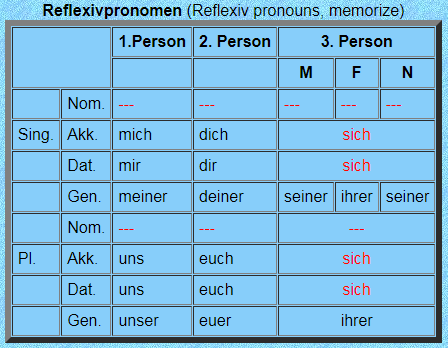Ich wasche mich. Du wäschst dich.
There are two different situations with Reflexivpronomen. One is with an echten reflexiven Verb, and one with an unechten reflexiven Verb. The former situation intrinsically demands the Reflexivpronomen and the verb should be learnt together with pronoun, similarly as in French, Italian, etc. In the situation with unechtem reflektivem Verb, a Reflexivpronomen is needed only when the sentence describes an event reflecting back to the person defined in the subject, rather than being directed to a third party. Example: Ich wasche mich, versus Ich wasche das Kind.
The following table is similar as that of the Personalpronomen, all differences shown in red. Clearly, there can be neither Nominativ nor formal addressing.

Examples:
(Im Akkusativ:) Du hast dich verletzt. Er/Sie/Es hat sich geweigert.
(Im Dativ:) Ich helfe mir selbst. Ihr habt euch damit selbst geholfen. Sie gefielen sich nicht in dieser Rolle.
(Im Genitiv:) Ich spotte meiner doch nicht selbst. Wir spotteten unser(selbst).
(Im Präpositionalkasus:)Ich habe etwas bei mir. Du denkst zu sehr an dich (selbst).
Comments: Adding "selbst" puts emphasis upon a sentence's reflectivity.
Präpositionalkasus means the declension is governed by a preposition. The case is usually memorized with such a preposition, and also indicated in dictionaries.


Reflexivpronomen can help clarify relationships. Examples:
"Peter hat sich gegenüber Max bereit erklärt sich zu entschuldigen" (=Peter will sich entschuldigen)
"Peter bat Max ihn zu entschuldigen" (=Max will Peter oder einen dritten entschuldigen)
Clarification, when a subject includes two or more persons, can be achieved through various forms of the Reflexivpronomen and one of the correlating terms einander and gegenseitig. Examples:
"Sie begegneten einander vor Gericht." (=They encountered each other in court)
"Verwaltung und Gäste unterstützten einander." (=Administration and guests supported each other)
"Die olympischen Läufer reichen sich gegenseitig die Fackel weiter." (The Olympic runners pass the torch, each runner to the next)
"Wir müssen uns die Erfahrungen gegenseitig austauschen." (The experiences, we must exchange among us, one to the other) Comment: Using "ourselves" in the translation would introduce here an element of ambiguity, as a minute's thought reveals.
Notice how the German sentences in these examples would be ambiguous without the clarifiers.
These clarifying terms may be combined, in word constructs, with a preposition. Examples:
"Die Wagen standen nebeneinander." (=The cars stood side by side of each other)
"Die Schrauben waren im Kasten durcheinander gelegen." (=The screws were lying pell-mell in the chest)
"Verkehrsteilnehmer sollen aufeinander achten." (=Traffic participants should watch for each other)
"Hund und Katze vertragen sich nicht miteinander." (=Dog and cat do not get on with one another)
A logical inconsistency, however, results from the combined use of einander and gegenseitig: "Sie schaden einander gegenseitig."
 英语
英语 日语
日语 韩语
韩语 法语
法语 西班牙语
西班牙语 意大利语
意大利语 阿拉伯语
阿拉伯语 葡萄牙语
葡萄牙语 越南语
越南语 俄语
俄语 芬兰语
芬兰语 泰语
泰语 丹麦语
丹麦语 对外汉语
对外汉语

